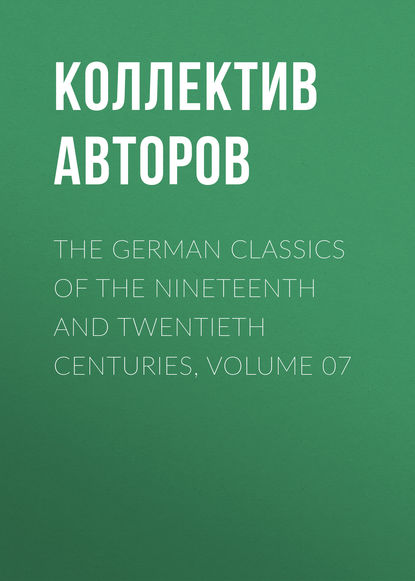По всем вопросам обращайтесь на: info@litportal.ru
(©) 2003-2024.
✖
The German Classics of the Nineteenth and Twentieth Centuries, Volume 07
Настройки чтения
Размер шрифта
Высота строк
Поля
You know the King's aversion toward music and dancing.
SONNSFELD
Here, Eckhof, take the violin-and now begin.
ECKHOF (looks about timidly).
But if I—[much moved] Heavens—it is three years since I have touched that noble, that magical instrument.
SONNSFELD
Come now! I'm the cavalier, Princess, and you are the lady.
[ECKHOF plays one of the simple naïve dance tunes of the day. The two ladies dance.]
SONNSFELD
Bravo, Eckhof! This is going nicely—ah, what joy to dance once more!
This way now la—la—la! [She hums the melody.]
SCENE II
During the dance the KING comes in softly through the door to the right. He starts when he sees the dancers and the grenadier playing the violin. They do not notice him. He comes-nearer and attempts to join the dance unobserved.
WILHELMINE
Sonnsfeld, that's not right! Now it's the gentleman's turn. [Holds her hand out behind her back]—Like this.
[The KING takes her hand gently with one finger and dances a few steps.]
WILHELMINE
How clumsy, dear friend. [Dancing.] And your hand is strangely rough today.
[She turns and sees the KING, who had begun to hum the tune in a gruff voice. The three start in alarm. ECKHOF salutes with the violin.]
KING (angry).
Very nice—very pretty indeed! Are these the sayings of Solomon? Music and dancing in my castle by broad daylight? And a Prussian grenadier playing the violin to the prisoner he is set to watch?
SONNSFELD
Pardon, Your Majesty—it was we who forced him.
KING
Forced him? Forced a soldier? Forced him to violate his duty in this devilish manner? I'll have to invent a punishment for him such as the Prussian army has never yet seen.
WILHELMINE
Have mercy, Your Majesty—have mercy!
KING
I'll talk to you later. As for you, Conrad Eckhof, I know that is your name—I will tell you what your punishment shall be. You are discharged from the army that serves under my glorious flag, discharged in disgrace. But you are not to be honored by being sent to a convict company or into the worthy station of a subject. Listen to the fate I have decreed for you. A troop of German comedians has taken quarters in the Warehouse in the Cloister street. These mountebanks—histriones—are in straits because their clown—for whom they sent to Leipzig, has not arrived. You are to take off the honorable Prussian uniform and to join this group of mountebanks, sent there by me, as a warning to every one. You are to become an actor, a clown of clowns-and henceforth amuse the German nation with your foolish and criminal jokes and quips. Shame upon you!
ECKHOF (with a grateful glance to heaven, trying to conceal his joyful excitement).
An actor! Oh, I thank Your Majesty for this most gracious sentence. Conrad Eckhof will endeavor to do honor to himself and his despised new profession.
[Goes out.]
KING
And as for you, my Lady Sonnsfeld, you may, the sooner the better, pack up your belongings and be off to Dresden where my cousin, the Elector of Saxony, has need of just such nymphs and graces for his court fireworks and his ballets.
SONNSFELD (going out, speaks aside).
In his anger he chooses punishments that can only delight any person of refinement. [She goes out.]
KING
Wilhelmine!
WILHELMINE
Your Majesty, what have I done that I am so unhappy as always to arouse your displeasure?
KING
You call me "Majesty" because you lack a daughter's heart for your father. I have brought up my children in the good old German fashion; I have tried to keep all French vanities and French follies far from their childish hearts; on my throne I have tried to prove that Kings may set an example to their subjects, an example of how the simplest honest household may be ruled. Have I succeeded in this?
WILHELMINE
You have punished us severely enough for our faults.
KING
This wigmaker—who was to instruct you in all the ambiguities of the
French language—
WILHELMINE
He was not a wigmaker.
KING. He was.

















